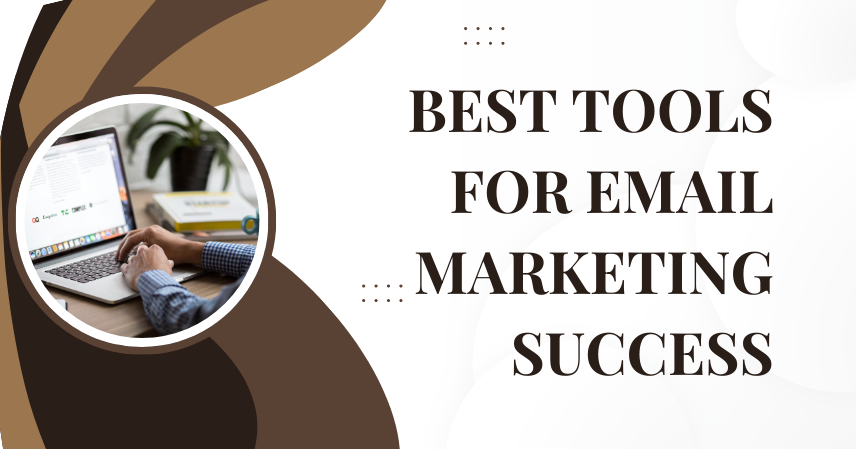In today’s digital-first world, email marketing remains one of the most powerful and cost-effective ways to connect with your audience, nurture leads, and drive sales. But to truly unlock its potential, businesses need more than a compelling message—they need the right tools to deliver it.
From automation to analytics, modern email marketing tools help you streamline campaigns, personalize content, and track performance. In this blog, we’ll explore the best tools for email marketing success in 2025, covering features, pricing, and what makes each platform stand out.
Why Email Marketing Tools Matter
Before we dive into specific platforms, let’s understand why using dedicated tools is essential for success:
- Automation: Schedule campaigns, set up autoresponders, and trigger emails based on user behavior.
- Personalization: Deliver tailored content using customer data and segmentation.
- Analytics: Track open rates, click-through rates, conversions, and more.
- List Management: Build, segment, and maintain healthy email lists effortlessly.
- Compliance: Ensure GDPR and CAN-SPAM compliance with built-in features.
Now, let’s explore the top tools helping businesses grow with email marketing.
1. Mailchimp
Best for: Beginners & small to mid-sized businesses
Mailchimp is one of the most popular email marketing platforms globally, known for its user-friendly interface, built-in templates, and drag-and-drop editor.
Key Features:
- Automated workflows
- A/B testing
- Pre-built journeys
- List segmentation
- Integrations with over 300 apps
Ideal for those starting with email marketing.
2. HubSpot Email Marketing
Best for: Businesses looking for all-in-one CRM and email marketing
HubSpot offers powerful email marketing capabilities within its free CRM. It’s best for marketers who want to align sales, email, and customer data on a single platform.
Key Features:
- Smart email personalization
- Built-in CRM integration
- Pre-designed templates
- Marketing automation workflows
Great for businesses that need seamless CRM integration.
3. ConvertKit
Best for: Creators, bloggers, and digital product sellers
ConvertKit is designed with creators in mind. It offers easy automation and excellent tagging features to help build email funnels and segment audiences.
Key Features:
- Visual automation builder
- Landing pages & forms
- Creator-focused templates
- Segmentation based on tags and behavior
Perfect for online coaches, bloggers, and YouTubers.
4. ActiveCampaign
Best for: Advanced marketers & ecommerce businesses
If you’re serious about automation, ActiveCampaign is a powerhouse tool. It goes beyond email to offer machine learning, predictive sending, and behavior-based triggers.
Key Features:
- Advanced automation workflows
- CRM and sales automation
- Dynamic email content
- Predictive email sending
For marketers who want deep segmentation and automation.
5. Brevo (formerly Sendinblue)
Best for: Small businesses and transactional emails
Brevo offers robust features like SMS marketing, live chat, and transactional emails—all in one place. Its pay-as-you-go model makes it budget-friendly.
Key Features:
- Email & SMS campaigns
- Drag-and-drop editor
- Real-time reporting
- Transactional emails
- Marketing automation
Great for businesses looking for multichannel messaging.
6. GetResponse
Best for: Ecommerce & webinar hosting
GetResponse combines traditional email marketing with webinars, landing pages, and sales funnels—making it a great pick for ecommerce brands.
Key Features:
- Sales funnel builder
- Webinars and lead magnets
- Email templates and segmentation
- Automation with behavioral triggers
Excellent for ecommerce and lead-gen campaigns.
7. MailerLite
Best for: Freelancers & startups with simple needs
MailerLite is an affordable, minimalist email tool that packs a punch. It’s easy to use and provides all essential features like automation, segmentation, and A/B testing.
Key Features:
- Simple automation editor
- Drag-and-drop email builder
- Landing pages & pop-ups
- Campaign analytics
A solid choice for budget-conscious marketers.
8. Moosend
Best for: Agencies and small businesses
Moosend offers a clean UI with automation templates, personalization features, and real-time reporting—ideal for those who want a no-fuss experience.
Key Features:
- Ready-made automation recipes
- Real-time analytics dashboard
- Custom reporting
- List segmentation
Ideal for small businesses scaling their email marketing.
What to Look for in an Email Marketing Tool
When choosing the best tool for your email marketing success, consider these factors:
Ease of Use: Does the interface suit your skill level?
Automation Features: Can it handle your workflow needs?
Analytics: Are reports detailed and easy to understand?
Integration: Does it connect with your CRM, e-commerce, or CMS platform?
Pricing: Does it fit your budget and scale with your growth?
Final Thoughts
Email marketing continues to deliver one of the highest ROIs in digital marketing. But to achieve that success, you need the right tools in your arsenal.
Whether you’re a beginner looking for simplicity or a marketing pro seeking advanced automation, the tools listed above offer something for every business. By choosing the one that aligns with your goals, audience, and workflow, you’re well on your way to email marketing success.

